Arrival at Kilimanjaro International Airport (JRO), where you will meet our on-site representative, and transfer to your hotel in Moshi.
In the evening there will be a briefing with our managers, who will also make sure you are ready to begin the climb.



A guide and a mountain support crew will arrive at the hotel in the morning in order to meet you and hold a quick briefing, after which you will travel by vehicle to Kilimanjaro National Park's northern entrance: Nalemuru Gate (2,020 m).
After the quick formality of acquiring climbing permits and registering with the search and rescue service, the group will start trekking up to Simba Camp (2,625 m).
Your trek this day will be moderate and take you through coniferous forest up Kilimanjaro's northern slope.
Remember not to hurry and always keep a comfortable pace. By the time you reach the camp, our professional mountain crew will prepare everything necessary, put tents and cook dinner for you.
This will be your first day at this altitude, so it is strongly recommended you heed the following instructions from this point on:
· Abstain from consuming alcohol and caffeine
· Drink over 4 liters of bottled water daily (little by little, frequently)
· Take a Diamox pill to help alleviate symptoms of altitude sickness.
Most mountain climbers take Diamox in the morning, before they start their ascent, in order to reduce discomfort associated with altitude sickness.
We recommend you consult your doctor prior to the trip in case of potential allergies.
At night you may experience discomfort associated with acclimatization to the high altitude: because of a reduction in your waking breathing pattern, your body gets less oxygen than during the day.
Taking altitude into account, you may therefore start feeling sick and have a headache.
Pay attention to your own body and tell your guide if you start feeling any symptoms of altitude sickness.
Change in Elevation: Nalemuru Gate (2,020 m) — Simba Camp (2,625 m)
Hiking distance: 8 km
Hiking time: 3–4 hours
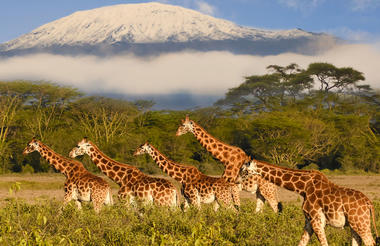
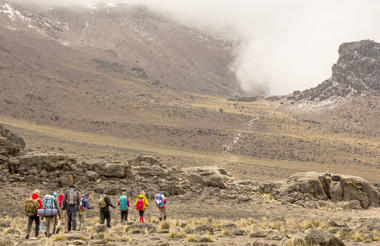
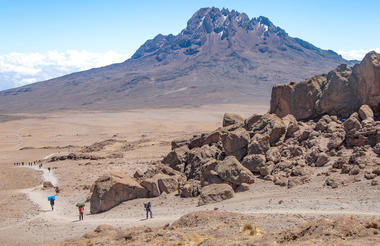
Early in the morning after breakfast, the group will depart from Simba Camp to start trekking towards your second high altitude camp: Kikileva Camp (3,630 m) where you can see Kibo Volcano at its finest (barring cloudy weather).
This trekking is more physically demanding than the previous one, so once you are in the camp, full rest is recommended.
Change in Elevation: Simba Camp (2,625 m) — Kikileva Camp (3,630 m)
Hiking distance: 10 km
Hiking time: 5–6 hours
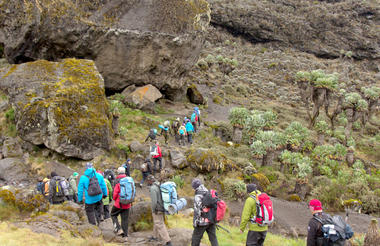
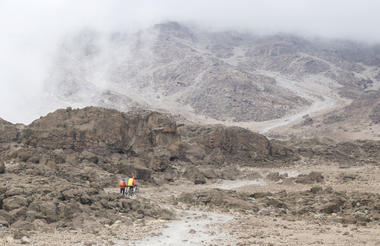
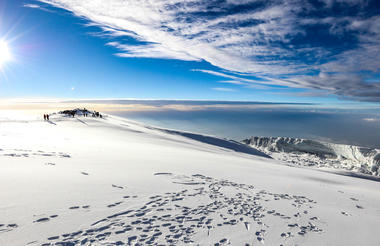
Early wakeup, breakfast and the start of trekking to Mawenzi Tarn Camp, which is situated at the foot of Mawenzi Volcano, Kilimanjaro's second summit.
When you reach the camp, you will have lunch and a two-hour rest, after which there will be an acclimatization hike towards Mawenzi Volcano with a 200-meter gain in altitude, followed by a hike back down to Mawenzi Tarn Camp, where you will have dinner in the evening.
Note:
The acclimatization hike is an easy trek with a slight gain in altitude done in order to speed up the acclimatization process.
You should take the acclimatization hikes very seriously. They help increase your chances of successfully summiting Kilimanjaro and save you from the consequences of altitude sickness.
Trekking from Kikileva Camp to Mawenzi Tarn Camp:
Change in Elevation: Kikileva Camp (3,630 m) — Mawenzi Tarn Camp (4,310 m)
Hiking distance: 6 km
Hiking time: 4–5 hours
Acclimatization hike:
Change in Elevation: Mawenzi Tarn Camp (4,310 m) — Destination point en route to Mawenzi Volcano (4,510 m)
Hiking distance: 2 km
Hiking time: 1–2 hours
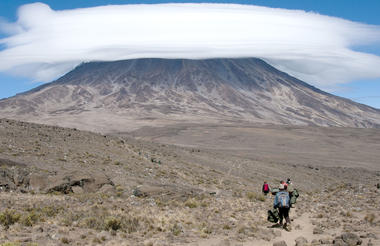
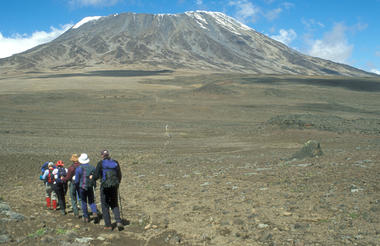
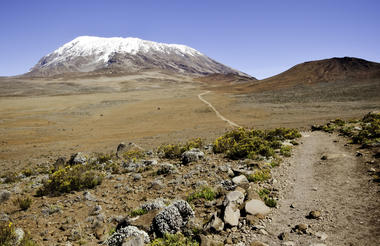
Early wakeup, breakfast and the start of trekking to Mawenzi Tarn Camp, which is situated at the foot of Mawenzi Volcano, Kilimanjaro's second summit.
When you reach the camp, you will have lunch and a two-hour rest, after which there will be an acclimatization hike towards Mawenzi Volcano with a 200-meter gain in altitude, followed by a hike back down to Mawenzi Tarn Camp, where you will have dinner in the evening.
Trekking from Kikileva Camp to Mawenzi Tarn Camp:
Change in Elevation: Kikileva Camp (3,630 m) — Mawenzi Tarn Camp (4,310 m)
Hiking distance: 6 km
Hiking time: 4–5 hours
Acclimatization hike:
Change in Elevation: Mawenzi Tarn Camp (4,310 m) — Destination point en route to Mawenzi Volcano (4,510 m)
Hiking distance: 2 km
Hiking time: 1–2 hours
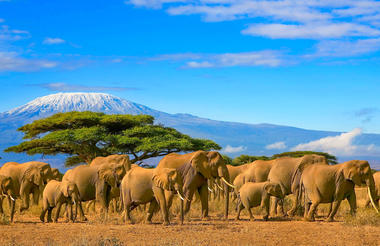
Night departure from School Hut Camp (4,715 m) and the start of your trekking to Kilimanjaro's summit: Uhuru peak (5,895 m).
The trekking will be moderate from a physical standpoint, but the altitude presents a much more serious problem. For the entire length of the trekking each pair of climbers will be accompanied by their own guide, who will be monitoring your stamina and mental resolve. A
fter your successful ascent to Uhuru Peak, you can descend to the nearest glacier if desired. Then you will return to Kibo Camp and after a two-hour rest continue your descent to Horombo Camp (3,720 m).
Note:
Don't forget that 90% of all accidents occur during the descent, including all broken arms and legs. Please pay attention to your feet, as there is a high risk of damaging your toenails.
Change in Elevation: School Hut Camp (4,715 m) — Uhuru Peak (5,895 m) — Horombo Camp (3,720 m)
Hiking distance: 21 km
Hiking time: 12–14 hours
You will be offered a warm breakfast in the morning, after which we will head for the Kilimanjaro National Park's exit: Marangu Gate (1,860 m).
After your descent the whole group will gather to congratulate you, and then you will have the chance to share your opinions on the trip in the guestbook.
Lastly, we will present you with your commemorative certificates (in our office) and provide you a transfer back to your hotel in Moshi.
Overnight at Ashanti Lodge.
Change in Elevation: Horombo Camp (3,720 m) — Marangu Gate (1,860 m)
Hiking distance: 18 km
Hiking time: 5–6 hours



Drive to Arusha for a short safari breifing and then continue to Manyara Serena Lodge.
Lunch will be served at the Lodge.
fternoon game drive in Manyara park.
Return to the Lodge in the late afternoon for dinner and overnight at Lake Manyara Serena Lodge
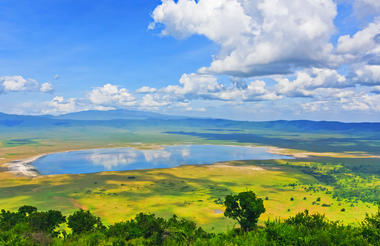
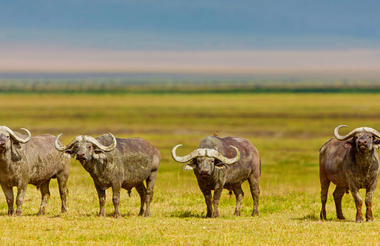
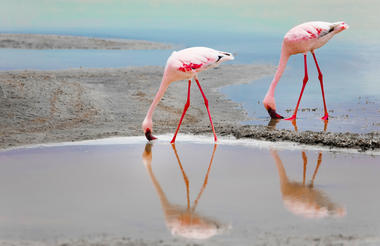
Drive to Ngorongoro Conservation Area arriving at your lodge situated on the crater rim.
Check in and relax.
Lunch will be served at the Lodge.
Afternoon at leisure.
Dinner and overnight at Ngorongoro Serena Lodge
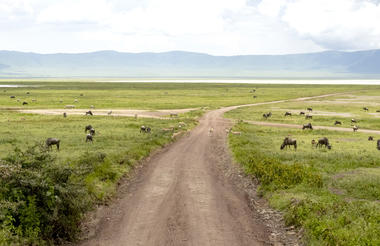
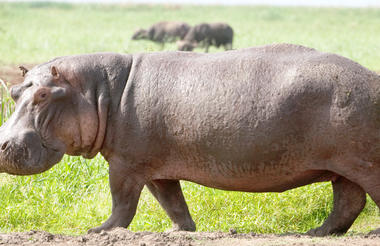

Today you descend onto the crater floor for a full day game drive.
Enjoy your picnic lunch close to the hippo pool.
Late afternoon ascend and drive back to Ngorongoro Serena Lodge for dinner.

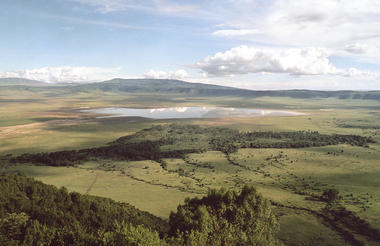
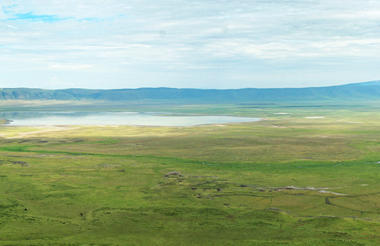
Transfer to Manyara airstrip for a scheduled flight to Kogatende departing at 0835hrs arrival.
On arrival met and transferred by camp vehicle to Serian Camp where you will spend the following 3 nights on full board basis plus drinks excluding vintage wines & champagne.
Unlimited game drives in camp’s 4x4 vehicle on exclusive basis. Sundowners, bush picnics and dinners.
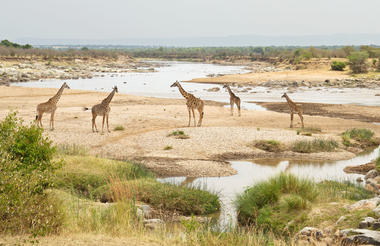
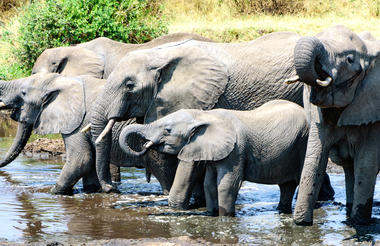
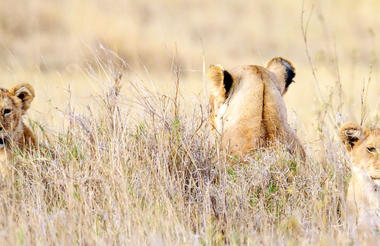
Transfer by camp vehicle to Kogatende airstrip with a packed lunch for Air Excel scheduled flight to Kilimanjaro Airport departing at 1000hrs arrival at 1245hrs.
On arrival connect your international flight.
BON VOYAGE AND THANK YOU FOR CHOOSING TREK EXPEDITIONS!
Additional remarks
We may have to reroute the itinerary or accommodate in similar lodges in case of non-availability.
Prices for domestic flights, airport taxes or park fees may be changed without prior notice. This is beyond our control and any increase levied will be passed to you.
Passenger Information
Passengers should bring only soft sided bags on safaris.
All the passengers must have Identification Card/Passport with them for internal flights.
Baggage on internal flights is strictly limited to 15kgs per person (including hand luggage). Any excess baggage will be charged by the airline at check-in.
Passengers arriving to Tanzania may be asked to present a valid Yellow Fever Vaccination Certificate.




